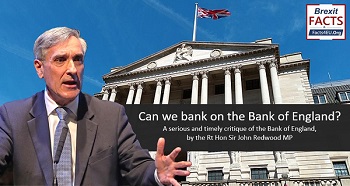‘Budget ’24 – an insider’s view’
While CIBUK remains strictly non-party political, we are nonetheless keen to promote and publish opinion pieces from across the spectrum on issues which affect us all.
To that end, we are pleased to re-publish the thoughts of former Secretary of State Sir John Redwood MP on the forthcoming budget from his diary entry of 11th February.
We are sure readers from across the spectrum will identify with many of the challenges which Sir John outlines in the piece below.
We are grateful as ever to our research affiliate Brexit Facts4EU.Org for bringing this article to our readers’ attention.
CIBUK and Facts4EU.Org presents an opinion piece by former Secretary of State, Sir John Redwood MP
In the article that follows, the Rt Hon Sir John Redwood MP puts forward his thoughts ahead of the all-important budget which will soon be presented by the Chancellor, Jeremy Hunt. Decisions made in the coming weeks will affect everyone in the United Kingdom.
Both CIBUK and Brexit Facts4EU.Org remains non-partisan and we present this as an opinion piece. Please note that the headings are ours and Sir John is not proposing his own manifesto.
Please support our work – we can’t carry on without your help:
“A lot rests on the budget”
By the Rt Hon Sir John Redwood MP

The polls show there are many former Conservative voters refusing to commit to Conservatives again who do not trust Labour or want a Labour government. They say they will not vote, or will vote Reform.
When pressed they say they want the government to do what it promised and what they expect Conservative governments to do.
‘Huge costs of immigration’
Defining this and delivering is therefore the task of Prime Minister and Chancellor. They recognise they need to curb migration, as the 2019 manifesto promised and as the Prime Minister has pledged. As they lower the excessively high rates of legal migration this year, they need to make sure the Treasury and OBR accounts for this in an accurate way. They should put in many economies on public services, as cutting migration by 330,000 as promised (legal and illegal) reduces pressure for school places, for health treatments and above all for subsidised housing. It should make it easier to honour the pledge to get the waiting lists down in the NHS.
The EU in 2016 said every new migrant costs the state €250,000 in capital to provide a home, and in costs to offer good public services.
‘Lower debt, halve inflation, grow the economy’
The government understand that winning people back is above all about the economy. Three of the Prime Minister’s own five pledges are to lower the debts, halve inflation and grow the economy. That is the right emphasis. People expect from a Conservative government: prudent finances, lower taxes, more jobs and decent growth.
They know from bitter experience that past Labour governments end with burgeoning debts, higher unemployment and downturns. The 1964-70 Labour government devalued the pound and had to go for austerity. The 1974-9 government ran out of money, had to borrow from the IMF and created a recession. The 1997-2010 government allowed an inflationary banking bubble, created a deep recession and ran out of money.
‘Resilience of UK Economy since 2010’
This government and its Conservative predecessors since 2010 have created 800 extra jobs every day they have been in office, got unemployment down, and presided over faster growth than the larger European countries. Even the shocks of Covid lockdowns and the Ukraine war did not undermine the good record on jobs, essential to people’s living standards and self-esteem.
All this makes the budget crucial to plans to win back lost voters and to show the economy is on track to deliver that faster growth, lower inflation and controlled debt people expect. The big inflation was a blow delivered by the Bank of England, making similar mistakes to the US and EU Central banks. If only they had kept money under better control as Japan and China did, we could have been spared that agony. Labour of course supported the Bank’s bad policies throughout.
Bank of England – policy mistakes
The task of growing the economy with low inflation is made very difficult by the very institutions that are meant to bring stability, wisdom and competence to the task. The Bank has followed its inflationary monetary policy phase with overdoing the correction. It now needlessly sells bonds at big losses to sandbag the Treasury and taxpayer with huge bills. The OBR pads the figures with bad news, usually exaggerating the future deficit and borrowing and acting as a shop steward for more public sector spending. It ignores the productivity collapse in the public sector and assumes all the current spending is worthwhile.
The Chancellor needs to cut through all this unhelpful policy and commentary. It is not money well spent to send the Bank of England £34bn so far this year to pay for their losses. They should stop selling the bonds they bought so badly at a loss and hold them to redemption. They should copy ECB policy on the payment of interest on commercial bank reserves to curb the running losses on their ill-judged portfolio.
This time last year Facts4EU.Org published a serious report on the BoE, from Sir John
Readers might wish to remind themselves of what Sir John wrote in February last year. It contains a damning indictment of the Bank.
‘Cut wasteful spending’
He should demand more care with quango and nationalised industry spending. Why are Post Office managers paid so much for losing the state a small fortune and for treating their sub-postmasters so badly? Why do the railways need £12bn a year of subsidy when they run so many near empty trains that people do not want to use, and fail to run trains people do want because they cannot get on with their staff? Why do large projects like HS2 and the nuclear plants overrun so badly?
‘Raising public sector productivity’
He should speed up and intensify the work he has asked the Chief Secretary and Cabinet Office Minister to do to win back the big losses of productivity in public services. There is around a £30bn extra cost to deliver the same things as in 2019 before allowing for all the extra costs of inflation on top. Where is the stop to all external recruitment into the civil service and administration of other public services to start winning back lost productivity? Why has the explosion of managers and Directors in the public sector resulted in so much worse productivity?
‘Evaluating cost of net zero’
He needs to review value for money and desirability of the various policies for net zero. £20bn for carbon capture and storage is a huge sum. This idea should be largely financed by the private sector with limited and phased taxpayer money. The Government car service has one third of its fleet now as electric cars, which cost 18% more than the ICE [internal combustion engine] cars they would otherwise have bought. Is this value for money? Why can’t the government concentrate its net zero spend on obvious wins like proper insulation and controls on heating and lighting in its vast public estate? Spending to save money as well as cutting energy use would be a win-win.
‘Folly of nationalisation’
Labour tells us we need more nationalisation, starting with the railways. As they are largely nationalised already, they see a way to do this without having to compensate existing owners. Which features of nationalised HS2 management does Labour think would help with the rest of the railway? Or is it the Post Office model of computerisation and treating staff that appeals?
Armed with better cost controls and an attack on some of these areas of needless spending, the Chancellor and PM could show how you get more public service for less cost under Conservatives. That would mean money left over for tax cuts to boost living standards and make it more worthwhile working. That is what all these reluctant Conservatives want.
– The Rt Hon Sir John Redwood, MP for Wokingham, 11 Feb 2024
Sir John writes daily here.
We are grateful to our affiliate, Brexit Facts4EU.Org for their kind permission to re-publish this article, a full copy of which can be found here.
Main image: Montage © Facts4EU.Org 2024

